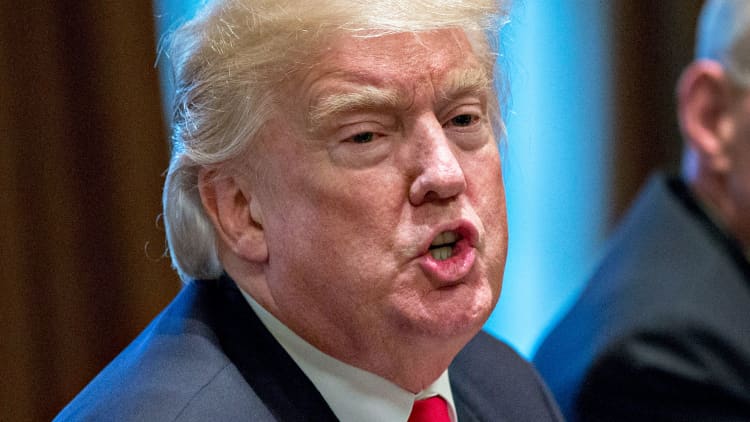
President Donald Trump, as he breaks one precedent after another in Washington, threatens to break prospects for tax cuts, too.
An all-Republican government has already proven, in its summer health-care debacle, that even modest intraparty dissent can sink a legislative mission that once appeared a sure thing. Now, before his tax bill has even gotten off the ground, Trump and his allies are fueling more dissent.
His former chief White House strategist, Steve Bannon, has announced an effort to mount primary challenges against a wide array of Republican Senate incumbents with the goal of ousting Majority Leader Mitch McConnell "and the entire establishment, globalist clique." Bannon has already helped defeat Alabama GOP Sen. Luther Strange by backing the successful primary challenge of conservative Christian extremist Roy Moore.
And Trump himself keeps spraying fire within his party, in all directions.
He threatens to shove aside Republican leaders to make deals with congressional Democrats.
He challenges his own secretary of State, who last week declined to deny that he had disparaged the president as a "moron," to an IQ contest.
And he took to Twitter on Tuesday morning to mock the physical stature of "Liddle Bob Corker," the Tennessee senator he had earlier accused of lacking "the guts" to seek re-election. That Corker enjoys wide respect within the GOP caucus only magnifies the hazard for the White House in alienating him.
To pass the tax-cut framework the White House and GOP leaders have laid out, McConnell will need the votes of at least 50 of his 52 members to go with Speaker Paul Ryan's 218 in the House. There are growing reasons to doubt they will have them.
Despite administration claims to the contrary, the framework would substantially increase federal deficits and debt. Corker, reflecting the views of a still-unknown number of deficit hawks, has already declared he won't back a bill that increases the deficit.
Despite administration claims to the contrary, the framework would give a substantial tax cut for the wealthiest Americans. Signs of intraparty resistance to repealing the estate tax have already appeared. Analysis so far suggests the framework would actually raise taxes on many upper-middle-class Republicans, while giving only modest cuts to Trump's working-class base.
The administration claims the tax bill will spur so much economic growth that it will actually help pay down the federal debt. Goldman Sachs, the Wall Street giant where Trump economic adviser Gary Cohn made his career and reputation, forecasts only modest growth that will cover just one-fifth of the cost of the tax cuts.
The deficit increase will only get larger if the White House backs off the plan to eliminate the federal deduction for state and local taxes. House Republicans from high-tax states such as New York, New Jersey, Illinois and California object.
Such objections are why the framework doesn't spell out other deductions to be eliminated. Delay raises the chance that such loophole-closers will never materialize, driving the cost of the bill even higher.
At the same time, Trump keeps boasting about record highs on Wall Street, declining unemployment, and robust corporate profits. That helps him claim his presidency has been a confidence-boosting success — but does not demonstrate an urgent need for tax cuts.
Currently, the strongest engine for passing tax-cut legislation is the argument that failure would expose Republicans to catastrophe in 2018 mid-term elections. That was also the strongest engine propelling the repeal-and-replacement of Obamacare. Given the real-world stakes, and broad public opposition, it wasn't strong enough.
On tax cuts, lawmakers have multiple reasons to choose from in opposing the White House if they privately want to. Trumpist attacks on Corker and his Republican Senate colleagues can only make more of them want to.


